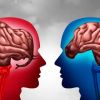-
 +25 +1
+25 +1New psychology study suggests shame plays key role in link between narcissism and maladaptive daydreaming
A study in Italy has found that characterological shame mediated the link between vulnerable narcissism and maladaptive daydreaming. The new findings suggest that vulnerable narcissists deal with their deep-seated sense of inadequacy by fantasizing about situations where their shame is overcome. This link was also present with grandiose narcissism, but was weaker. The study was published in Personality and Individual Differences.
-
 +14 +1
+14 +1People associate Black with male and Asian with female, but the extent they do so depends on their identity
Past psychology research has shown that people associate Black with male and Asian with female. New findings have revealed that this association is weaker among people who fit the counter-stereotype — Black women and Asian men. The findings were published in Social Psychological and Personality Science.
-
 +4 +1
+4 +1Children more likely to see a White person as being "in charge" compared to a Black person
Social hierarchies exist across cultures and people use distinct cues such as prestige and wealth to determine where other people fit in society. However, information these cues is not always available and is inferred by other information such as the person’s race or gender. New research published in the Journal of Experimental Child Psychology found that children use race and posture cues to infer who is “in charge” between two adults.
-
 +14 +1
+14 +1AI can predict your political ideology using just a brain scan
A group of researchers claims to have developed a system that can determine a person's political ideology by looking at their brain scans, using "state-of-the-art artificial intelligence algorithms." Wow! Either this is the most powerful AI system in the known universe, or it's a complete ruse. It's a ruse, of course: there's little cause to get excited. To refute the researcher's work, you don't even need to read their article. We're done now. All you need is the words "politics change."
-
 +23 +1
+23 +1Most cannabis use is depicted positively on TikTok, study finds
Cannabis use is widespread and becoming more normalized as it becomes legalized in more areas around the world. Another method cannabis use is becoming normalized is through social media platforms such as TikTok.
-
 +14 +1
+14 +1Are we born vegetarian? Children less likely to see farm animals as food
The morality of eating cheeseburgers, steaks, and everything in between is a controversial topic. Many abstain completely from meat in their diet out of empathy for animals, while others see nothing wrong with visiting a steak house on a Saturday night. Now, new research is accounting for age in the meat-morality debate. Scientists report children generally consider eating meat as less morally acceptable than adults.
-
 +15 +1
+15 +1Men with higher levels of dark personality traits exhibit a greater tendency towards infidelity
Having a partner with a ‘dark personality’ can put you at higher risk of suffering repeated infidelity, a study published in the Acta Psychologica journal reveals. The concept of a ‘dark personality’ comes from a triad proposed by personality theorists and includes subclinical narcissism (focus on oneself), psychopathy (lack of empathy, remorselessness), and Machiavellianism (cynicism, acting in self-interest). Other traits associated with a dark personality are sadism, selfishness, moral disengagement, and resentment.
-
 +13 +1
+13 +1Study pinpoints a negative view of the past — and a negative memory bias — as key aspects of vulnerable narcissism
A series of studies published in the Journal of Research in Personality suggests that the traits of vulnerable narcissism and a negative view of the past are associated with similar personality profiles. Both concepts were associated with high neuroticism and antagonism, low self-esteem, and a negative memory bias.
-
 +3 +1
+3 +1Trying to make other people happy makes us happier than trying to make ourselves happy
The secret to happiness may lie in doing things to make other people happy, rather than ourselves, according to a series of five studies published in the Journal of Positive Psychology. The findings suggest that doing things for others enhances well-being by fulfilling a psychological need for connection with others — even if that person is a stranger.
-
 +16 +1
+16 +1Men are more likely to respond negatively to gender threats in the workplace than women, research finds
When male workers believe their gender status is threatened, they are more likely than their female counterparts to engage in deviant behavior such as lying, cheating or stealing in the workplace, new research suggests.
-
 +16 +1
+16 +1Face masks impair people's ability to accurately classify emotional expressions
New research suggests that masks can impact social functioning. The study, published in PLOS One, found that masks diminish people’s ability to accurately identify facial expressions. Face masks have been widely adopted in an effort to slow the spread of COVID-19, but little is known about the psychological consequences of this development.
-
 +14 +1
+14 +1Why happiness is becoming more expensive and out of reach
New research from University of Sydney has found that the income level required to be happy in Australia has been increasing and moving out of reach of most Australians.
-
 +26 +1
+26 +1Facebook reportedly is aware of the level of ‘problematic use’ among its users
Facebook’s own internal research found 1 in 8 of its users reported compulsive social media use that interfered with their sleep, work, and relationships— what the social media platform calls “problematic use” but is more commonly known as “internet addiction,” the Wall Street Journal reported.
-
 +13 +1
+13 +1To Overcome Depression, Think Flexibly, Not Positively.
New research reviews thinking errors in depression. Suppose you are leaving a party, when, suddenly, you notice a guest looking at you and frowning. Why is the person frowning?
-
 +11 +1
+11 +1If You Want To Enjoy Leisure Time, Don’t Think Of It As Wasteful
However you like to take time for yourself, from reading to hiking to playing video games, leisure time can be a vital way of relaxing, promoting good mental and physical health, boosting social relationships, and inducing happiness. But whether we fully experience those benefits, a new study suggests, may depend on the way we view leisure time itself.
-
 +4 +1
+4 +1We’re More Likely To Steal From Large Groups Than From Individuals
We’re all aware of the financial disparity that plagues our economic systems. Many of those at the top of large corporations seem content to exploit large groups of people for their own significant financial gain.
-
 +11 +1
+11 +1World's Isolated House - The Best Location To Survive COVID-19.
Who is it that lives alone in this Isolated House? And how do they go about purchasing basics such as food and medicine? There is a popular saying, “No man is an island.” Some people, on the other hand, would like to live alone for the rest of their life or for a period of time. This might be for a variety of causes or for no apparent reason at all.
-
 +20 +1
+20 +1People low in self-esteem may be less vulnerable to the impact of romantic breakups than previously thought
A new study suggests that previous research may have overestimated the influence of self-esteem on changes in wellbeing following a breakup. The research found that most people felt less satisfied with life in the wake of their romantic relationship ending, but there was only a small difference between those with low and those with high self-esteem.
-
 +17 +1
+17 +1If You’re so Smart, Why Aren’t You Rich? Turns out It’s Just Chance.
The most successful people are not the most talented, just the luckiest, a new computer model of wealth creation confirms. Taking that into account can maximize return on many kinds of investment. The distribution of wealth follows a well-known pattern sometimes called an 80:20 rule: 80 percent of the wealth is owned by 20 percent of the people. Indeed, a report last year concluded that just eight men had a total wealth equivalent to that of the world’s poorest 3.8 billion people.
-
 +3 +1
+3 +1At Just 16 Months Old, Toddlers Will Reward Someone For Acting Fairly
Although we often think of young children as rather selfish, research has shown that babies and toddlers have a surprisingly strong sense of what is fair. At one year old, kids already expect resources to be divided fairly and for people to be helpful towards others. By two, they themselves tend to distribute resources equally, and would rather play with a fair adult than an unfair one.
Submit a link
Start a discussion




















